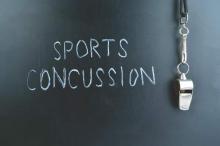Adolescents who underwent cognitive-behavioral therapy (CBT) as part of postconcussion care reported significantly lower levels of postconcussive symptoms and depressive symptoms in a randomized trial of 49 patients aged 11-17 years. The report was published online Sept. 12 in Pediatrics.
“Affective symptoms, including depression and anxiety, commonly co-occur with cognitive and somatic symptoms and may prolong recovery from postconcussive symptoms, wrote Carolyn A. McCarty, PhD, of Seattle Children’s Hospital, Washington, and her colleagues. “The complexities of managing persistent postconcussive symptoms in conjunction with comorbid psychological symptoms create a significant burden for injured children and adolescents, their families, and schools” (Pediatrics. 2016. doi: 10.1542/peds.2016-0459).
To determine the impact of CBT on persistent symptoms in adolescents with concussions, the researchers randomized 49 patients to usual care or a collaborative care plan that included usual care plus CBT.
After 6 months, approximately 13% of the teens in the CBT group reported high levels of postconcussive symptoms, compared with 42% of controls. In addition, 78% of CBT patients reported a depressive symptom reduction of more than 50%, compared with 46% of controls.
Concussions were diagnosed by sports medicine or rehabilitative medicine specialists. The patients assigned to CBT received usual care management, CBT, and possible psychopharmacological consultation. Control patients received usual concussion care, generally defined as an initial visit with a sports medicine physician and assessments at 1, 3, and 6 months. Usual care also could include MRI, sleep medication, and subthreshold exercise, depending on the patient. No serious adverse events were reported. The average age of the patients was 15 years, approximately 65% were girls, and 76% were white.
Overall, 83% of the CBT patients and 87% of their parents were “very satisfied” with their care, compared with 46% of patients and 29% of parents in the control group.
“Although patients in both groups showed symptom reduction in the first 3 months, only those who received collaborative care demonstrated sustained improvements through 6 months of follow-up,” Dr. McCarty and her colleagues wrote.
The results were limited by several factors including the small size of the study, the researchers said. However, the findings “prompt more investigation into the role of affective symptoms in perpetuating physical symptoms secondary to prolonged recovery from sports-related concussion,” and also suggest that collaborative care can help improve persistent postconcussive symptoms in teens.
Dr. McCarty and her colleagues had no relevant financial conflicts to disclose. The Seattle Sports Concussion Research Collaborative supported the study.


